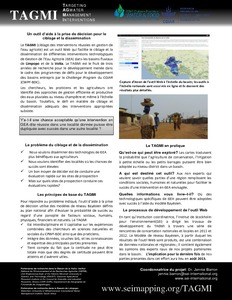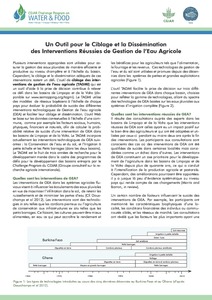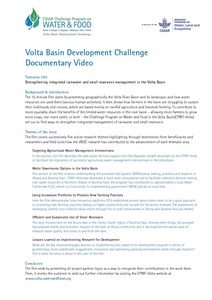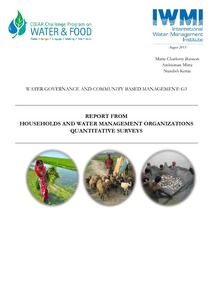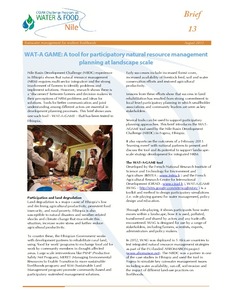Un Outil pour le Ciblage et la Disse?mination des Interventions Re?ussies de Gestion de l’Eau Agricole
Volta Basin Development Challenge Documentary Video
Report from Households and Water Management Organizations Quantitative Surveys
The Ganges project on ‘Water Governance and Community-Based Management’ conducted a series of household and water management organization surveys in its coastal Bangladesh study sites. This report presents the methodology and describes the results from the survey. The report can be read as a quantitative situation analysis of the area. Most of the results are desegregated by location for a comparison purpose: comparison between two types of institutions (polders/sub-projects) and comparison between three main geo-hydrologic zones (high, medium and low level of salinity).
WAT-A GAME: A tool for participatory natural resource management planning at landscape scale
Water Resource Development in Northern Afghanistan and Its Implications for Amu Darya Basin
This study attempts to provide an
overview of (a) the amount of Amu Darya flows generated in
the northern Afghanistan; (b) the amount of water presently
used in northern Afghanistan, prospective use in the near
future, and possible impact of the increased use on the
riparian states and the Aral Sea; (c) existing agreements
between Afghanistan and the neighboring Central Asian States
regarding the use waters in the Amu Darya Basin, their
Running Pure : The Importance of Forest Protected Areas to Drinking Water
This report focuses on one specific
interaction: the role of forests, and particularly protected
forests, in maintaining quality of drinking water for large
cities. There are many reasons for this focus: many city
dwellers already face a crisis of water quality, and
contaminated water spreads a vast and largely unnecessary
burden in terms of short and long-term health impacts
including infant mortality, with knock-on effects on ability
Water Resources Sector Strategy : Strategic Directions for World Bank Engagement
In 1993 the Board of the World Bank
endorsed a Water Resources Management Policy Paper (WRMPP).
In that paper, and in this Strategy, water resources
management comprises the institutional framework (legal,
regulatory and organizational roles), management instruments
(regulatory and financial), and the development, maintenance
and operation of infrastructure (including water storage
structures and conveyance, wastewater treatment, and
Arab Republic of Egypt - Toward Agricultural Competitiveness in the 21st Century : An Agricultural Export-Oriented Strategy
The report proposes key elements for an
agricultural export-oriented strategy in Egypt, that would
build on the achievements of the agricultural strategy
during the 1990s. Substantial improvements in the
country's macroeconomic environment, following policy
reforms - though necessary - have not been sufficient to
improve agricultural export performance. Overall, while
Egyptian agricultural production increased during the 90s,
The Institutional Economics of Water : A Cross-Country Analysis of Institutions and Performance
This book provides a detailed and
comprehensive evaluation of water reform and water sector
performance from the perspectives of institutional economics
and political economy. It integrates institutional theory
with resource economics, and set against an exhaustive
review of the theoretical and empirical literature, the
authors develop an alternative methodology to quantitatively
assess the performance of institutions in the context of
Algeria : National Environmental Action Plan for Sustainable Development
This staff sector assessment note
accompanies the recently completed national environmental
action plan for sustainable development (NEAP-SD), which, as
an output of the Industrial Pollution Control Project in
Algeria, focused on charting a new course for environmental
management in the country, based on an objective assessment
of past policy, and institutional failures, on a new
consensus on the need for mainstreaming the environment into
China : Agenda for Water Sector Strategy for North China,
Volume 3. Statistical Annexes
The acute water shortage, and pollution
problems in North China have been exacerbated by the
continued population growth, and the accelerated industrial
expansion over the past half-century, conducive to
increasingly severe freshwater shortages, and catastrophic
consequences for the future. Significant commitments need to
be made to rapidly implement strategies to bring water
resource utilization back into a sustainable balance. The

